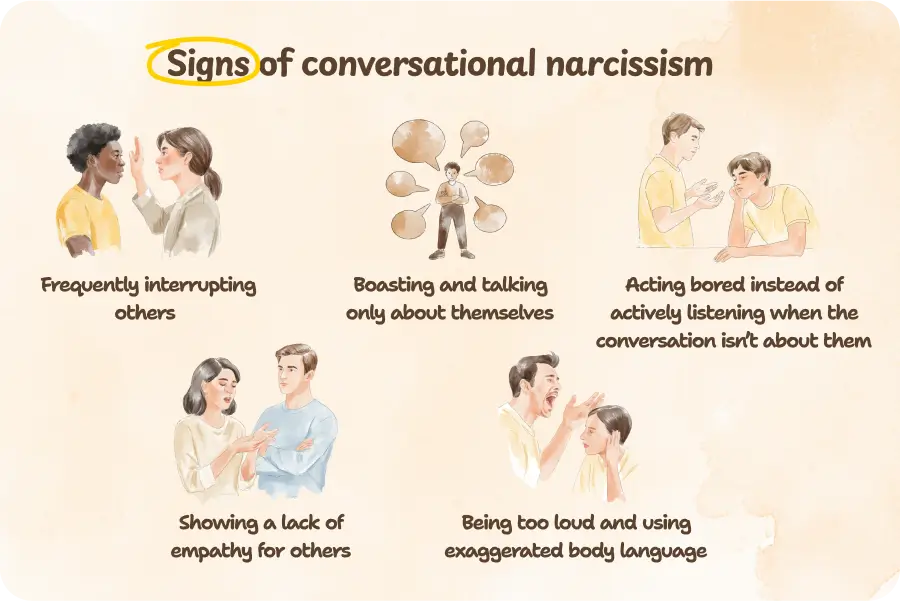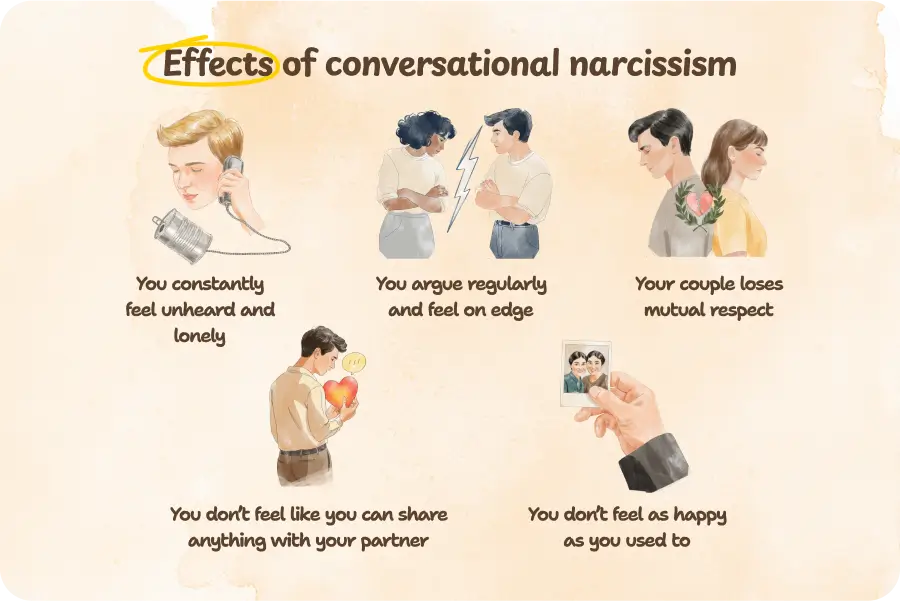Podcast name
Conversational narcissism
You talk to someone who interrupts you constantly and seems interested only when the topic comes to them. It means that you might have met a conversational narcissist. They leave little space for others and have a constant need for attention.
Here, we’ll explain how to spot a conversational narcissist, why regular connection with them may be frustrating, and how to avoid feeling drained after it. Also, if you suppose that you may behave like one from time to time, keep reading to find out how to fix it.
What is conversational narcissism?
Conversational narcissism is a style of communication where a person makes every interaction about themselves, dominates in discussions, shows little interest in others’ thoughts, and disregards people’s experiences.
Even though the phenomenon is called “narcissism,” it doesn’t necessarily stem from narcissistic personality disorder or mean that the person is a narcissist. It’s rather a pattern of behaviors that can appear in anyone for varying reasons.
Some people may attract attention to themselves unintentionally out of a desire to feel valued. Others may do this on purpose out of their narcissistic traits, because this is the only way they know to maintain a sense of importance or control in social settings.
Do you know people who engage in conversational narcissism?
Signs of conversational narcissism
It may be challenging to spot conversational narcissism at first because the interaction can look like an innocent habit.
Below, we’ll highlight the signs of this communicational style based on the study published in Communication Monographs. [1] They can help you understand that you’ve met a conversational narcissist and prepare yourself to handle such interactions more consciously.
1. Frequently interrupting others
Conversational narcissists won’t let you finish the story. If you’re describing your weekend, they may constantly interrupt with, “By the way, I was…” or “I don’t like staying in bed for the whole day,” even if you are mid-sentence.
Also, they may try to give unsolicited advice that can sometimes turn into another story about their own experiences. They might say, “You know, I used to have the same misconception but managed to overcome it,” even if you didn’t ask them about anything.
2. Boasting and talking only about themselves
Talking with a conversational narcissist is rarely based on mutual interest. Such people’s goal is to stay in the spotlight. They may:
- Constantly tell you about their achievements even if it isn’t linked to the initial topic.
- Take every opportunity to highlight their successes, status, or connections.
- Exaggerate details to appear more impressive.
3. Acting bored instead of actively listening when the conversation isn’t about them
In case the discussion shifts to others’ lives and the conversational narcissist needs to wait for their turn, they may intentionally show frustration. These people provide few answers to others’ stories and comments, or appear irritated when you focus on something they aren’t good at or able to speak on.

4. Showing a lack of empathy for others
When another person talks about a challenging situation, conversational narcissists can avoid eye contact and shift the response to their own feelings. For instance, when someone says, “I feel so frustrated because I can’t find a new job,” such a person can answer, “I’m so busy at my work. You don’t understand how hard it is.”
This is because conversational narcissists find it challenging to provide genuine support responses or helpful advice.
5. Being too loud and using exaggerated body language
To show their power and attract even more attention, conversational narcissists can use dramatic gestures. Their voice and body may try to dominate the space so that others recognize their importance. These people may do this unconsciously as a part of their habitual communication style, not necessarily to intimidate, but to ensure they remain the center of attention.
What causes conversational narcissism?
There are numerous reasons why a person might be a conversational narcissist.
1. Narcissistic traits
People living with narcissistic traits may have a strong need to be seen, heard, and admired. They desire to dominate conversations and attract attention from others, as this is the way to reaffirm their sense of self-worth. While those with narcissistic traits can seem confident at first sight, they might keep asking themselves, “Why am I so insecure?” and show their insecurities through excessive talking and constant redirection to themselves.
2. Low self-esteem
Insecure people may develop this communicational style to hide their vulnerabilities and gain a sense of importance. Constantly talking about their achievements allows them to feel validated.
Also, keeping the focus on their success stories allows some conversational narcissists to avoid discussing topics that might make them feel unconfident. Past wounds, future worries, and doubts have no place when they rule the conversation.
3. ADHD tendencies
Interrupting others and wandering to different topics unexpectedly can be a sign of ADHD, a neurodevelopmental disorder characterized by difficulties with attention regulation and executive functioning. Impulsivity is one of the main symptoms of the disorder. It makes it challenging for people with ADHD to:
- Listen till the end of the sentence.
- Wait for their turn.
- Notice social cues.
- Control thoughts that move unpredictably.
Although frequent interruptions may look like conversational narcissism, in the case of people living with ADHD, this behavior is caused by difficulty controlling attention and impulsivity.
4. Learned behavior
Studies prove that young children can mirror the communication styles of important adults [2] and may bring this behavior into adulthood. As such, if parents in some families are used to interrupting each other and competing for the spotlight, a kid may grow up believing that it’s normal.
Conversational narcissism development may also stem from social or cultural factors. In some communities, people praise assertiveness and active listening, while others value people who stand out from the crowd. It can also reinforce people, especially children, to engage in those behaviors.
5. Lack of communication skills
Some people may lack understanding of how to maintain a balanced conversation. What they consider a good comment, others may find rather inappropriate.
Furthermore, some conversational introverts may be aware of the need to enhance their communication skills. They may try too hard to contribute and end up talking mostly about themselves. Even if they just want to join the conversation, it can seem self-centered.
6. Narcissistic personality disorder (NPD)
NPD is a psychological condition characterized by a feeling of grandiosity and a constant need for admiration. People living with it can engage in conversational narcissism to boost their ego. They truly believe that their opinion is the most important and their life is the most interesting, so everyone around needs to know about it.
How conversational narcissism influences relationships (effects of conversational narcissism)
When you’re comfortable talking with your partner, it strengthens an emotional bond and fosters healthy relationships, according to the 2025 study. [3] On the other hand, if you can’t build effective communication within the couple, it can negatively influence the overall dynamic. Here are the possible effects:
1. You constantly feel unheard and lonely
You can’t share your worries, discuss your frustrations, and goals. When every conversation focuses only on your partner, it’s easy to feel undervalued. You may think something like, “I have no one to talk to about a tough day at work,” or “Even my loved one doesn’t care about how I really feel.”
2. You argue regularly and feel on edge
This feeling of loneliness may lead to increased tension. You can argue to shift their focus to your relationship issues (even if you don’t realize it). And if the situation doesn’t change, you may want to consider leaving them to meet someone more supportive.
3. Your couple loses mutual respect
Expert Insight
“Such behaviors can create a lot of tension within relationships if both partners do not feel listened to, validated, and heard. If one partner dominates most conversations and is unable to attend to the other partner’s needs, it can result in significant conflict and loss of respect for one another.”
Hannah Schlueter
Mental health professional
4. You don’t feel like you can share anything with your partner
Meaningful connection and emotional intimacy develop through deep talks. Conversational narcissism makes it almost impossible to understand each other’s perspectives. So, one day, you can feel like you can’t share anything with your partner because it isn’t important to them, or they simply won’t listen.
5. You don’t feel as happy as you used to
When all these challenges come together, it’s common for your relationships to make you feel frustrated rather than happy. If you constantly need to deserve attention and validation from a partner, it may be rather exhausting. And if the imbalance doesn’t change, interactions may start feeling like a constant effort.

How to deal with a conversational narcissist
Regular communication with a conversational narcissist might negatively influence your self-esteem and overall mental health. However, it’s possible to minimize its influence or even change the style of your communication over time. This is what can help:
1. Explain politely that you feel uncomfortable
Some people, particularly those with low self-esteem or a lack of communication skills, may simply lack understanding that they have hurt you. You can simply point out that regular interruptions or focusing on their persona might feel frustrating.
Don’t expect their behavior to change overnight. However, when you set clear boundaries, you help them understand how their behavior affects you.
Also, during the conversation, you can use phrases like:
- “I got your point, but I want to finish the story.”
- “Let us discuss something else for a bit.”
- “Can we go back to what I was saying?”
2. Don’t compete for the spotlight
If both people try to get more attention and opportunities to discuss something, a good conversation can turn into an argument. Instead, the other person can gently redirect the focus of someone with conversational narcissism and shift the dialogue in the way they want.
3. Stay assertive
When a listener gets too involved in a conversational narcissist’s story, it can motivate them to add even more details. Instead, avoid investing too many emotions, but don’t be rude. You can use short answers like “I understand” or “Got it,” and then shift the topic to what you need. This way, a person won’t get the validation they need.
4. Find common interests
Maybe there are activities or things that you both are interested in. For instance, if a person with conversational narcissism is your colleague, you may concentrate on work tasks or common projects. Or if your friend tends to focus on themselves, you may find out that you both like tennis. That can become a neutral topic to keep the interaction engaging for both people.
5. If nothing helps, think about increasing the distance
Sometimes it may be better to reduce communication with a self-centered person rather than try to find common ground. For instance, if it’s just a person from your friend group, a distant relative, or a partner’s friend, you can avoid one-on-one conversations. If it’s your boss or a family member you need to stay connected with, you can try limiting how much time you spend together and focus only on practical topics.
How to avoid being a conversational narcissist yourself
Once you understand that you may be a conversational narcissist, here are some things that can help you avoid talking too much about yourself.
1. Meet your true self first
A good conversation can happen if both people have a high level of emotional intelligence. Nevertheless, if you don’t understand your own emotions, you can unconsciously show little empathy or focus only on your perspective. The Breeze app provides:
- Self-discovery tests to spot patterns in your behavior. If you face imposter syndrome or self-esteem challenges, the test will reveal them and provide you with tailored insights on how to overcome them.
- Journaling options and mood tracker. When something makes you constantly worried or frustrated, you can start oversharing. Instead, write it down in the app and engage in a deeper reflection. It will give you more control over your emotions.
2. Practice active listening
Active listening involves fully immersing yourself in the conversation and demonstrating genuine interest in the other person. You can do it by:
- Maintaining eye contact.
- Sharing your own experiences only when asked.
- Nodding.
- Using small verbal cues.
3. Prepare questions to have a good conversation
Apart from practicing active listening, you can also prepare some simple questions to use when you feel that you talk too much. Use these ideas or create your own, depending on the topic:
- What do you think about it?
- Do you agree with me?
- How do you usually handle situations like this?
- Can you tell me more about that?
- Do you feel comfortable when we talk about it?
4. Notice non-verbal cues
People might be too polite to tell you that they feel uncomfortable. However, their body language can show it much better. If someone begins scrolling through their phone, takes a big inhale, opens their mouth, or looks around, maybe they’re bored and want to change the topic. Pay attention to such non-verbal things to rule out when it’s time to pause or wrap up.
5. Discuss the issue with a mental health professional
Hannah Schlueter, MA, LAC, comments, “Overcoming these patterns starts with building a person’s own emotional literacy and then utilizing skills to help them find a deeper connection within interactions with others. Improving their self-esteem as well as empathy for others can be significantly helpful in creating more adaptive interpersonal skills.”
Frequently asked questions
Can conversational narcissism be unintentional?
Yes, someone can behave like a conversational narcissist even though they have good intentions. For instance, when a person feels overwhelmed by some news, they might interrupt others and overshare. Also, someone who has unstable self-esteem, lacks communication skills, or lives with ADHD may not notice that they dominate the conversation.
What’s the difference between ADHD-related oversharing and conversational narcissism?
ADHD-related oversharing is unconscious and happens because a person can’t control impulses and stay focused. Conversational narcissism might stem from an ego and a desire to be in the spotlight.
Yet, ADHD-related oversharing can also be considered an unintentional type of conversational narcissism.
What is passive conversational narcissism?
Passive conversational narcissism is a pattern of behavior in which a person doesn’t provide support responses in a conversation. They might say something like “Hmm” or “Nice” rather than showing curiosity. At the same time, when the topic comes to them, such people suddenly become much more talkative.
Sources
- Vangelisti, Anita & Knapp, Mark & Daly, John. (1990). “Conversational narcissism. Communication Monographs” – COMMUN MONOGR.
- Nazlı Altınok, Harriet Over, Malinda Carpenter. “Young children use imitation communicatively.” Journal of Experimental Child Psychology. 2023
- Soid, & Fatih, Muhammad & Fauzi, Nanang & Norman, Efrita. (2025). “Effective Communication in Building Healthy and Productive Relationships.” MES Management Journal.
Disclaimer
This article is for general informative and self-discovery purposes only. It should not replace expert guidance from professionals.
Any action you take in response to the information in this article, whether directly or indirectly, is solely your responsibility and is done at your own risk. Breeze content team and its mental health experts disclaim any liability, loss, or risk, personal, professional, or otherwise, which may result from the use and/or application of any content.
Always consult your doctor or other certified health practitioner with any medical questions or concerns
Breeze articles exclusively cite trusted sources, such as academic research institutions and medical associations, including research and studies from PubMed, ResearchGate, or similar databases. Examine our subject-matter editors and editorial process to see how we verify facts and maintain the accuracy, reliability, and trustworthiness of our material.
Was this article helpful?









